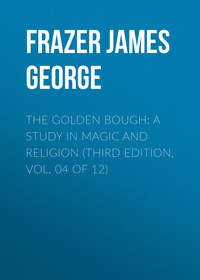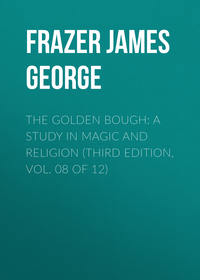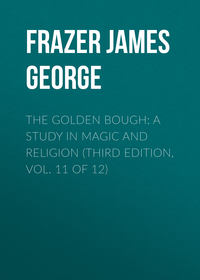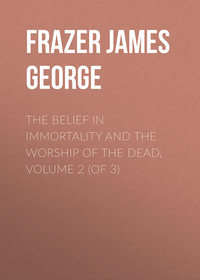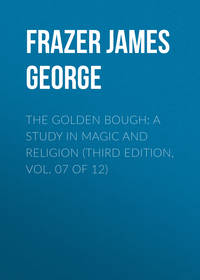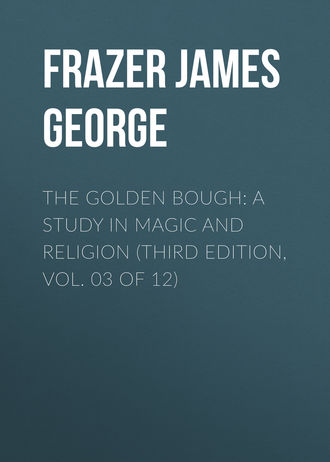 полная версия
полная версияThe Golden Bough: A Study in Magic and Religion (Third Edition, Vol. 03 of 12)
Common words tabooed in Sunda, Borneo, and the Philippines.
In some parts of Sunda it is taboo or forbidden to call a goat a goat; it must be called a “deer under the house.” A tiger may not be spoken of as a tiger; he must be referred to as “the supple one,” “the one there,” “the honourable,” “the whiskered one,” and so on. Neither a wild boar nor a mouse may be mentioned by its proper name; a boar must be called “the beautiful one” (masculine) and the mouse “the beautiful one” (feminine). When the people are asked what would be the consequence of breaking a taboo, they generally say that the person or thing would suffer for it, either by meeting with a mishap or by falling ill. But some say they do not so much fear a misfortune as experience an indefinite feeling, half fear, half reverence, towards an institution of their forefathers. Others can assign no reason for observing the taboos, and cut enquiry short by saying that “It is so because it is so.”1544 When the Kenyahs of Borneo are about to poison the fish of a section of the river with the tuba root, they always speak of the matter as little as possible and use the most indirect and fanciful modes of expression. Thus they will say, “There are many leaves fallen here,” meaning that there are many fish in the river. And they will not breathe the name of the tuba root; if they must refer to it, they call it pakat abong, where abong is the name of a strong-smelling root something like tuba, and pakat means “to agree upon”; so that pakat abong signifies “what we have agreed to call abong.” This concealment of the truth deceives all the bats, birds, and insects, which might otherwise overhear the talk of the men and inform the fish of the deep-laid plot against them.1545 These Kenyahs also fear the crocodile and do not like to mention it by name, especially if one be in sight; they refer to the beast as “the old grandfather.”1546 When small-pox invades a village of the Sakarang Dyaks in Borneo, the people desert the place and take refuge in the jungle. In the daytime they do not dare to stir or to speak above a whisper, lest the spirits should see or hear them. They do not call the small-pox by its proper name, but speak of it as “jungle leaves” or “fruit” or “the chief,” and ask the sufferer, “Has he left you?” and the question is put in a whisper lest the spirit should hear.1547 Natives of the Philippines were formerly prohibited from speaking of the chase in the house of a fisherman and from speaking of fishing in the house of a hunter; journeying by land they might not talk of marine matters, and sailing on the sea they might not talk of terrestrial matters.1548
The avoidance of common words seems to be based on a fear of spirits and a wish to deceive them or elude their notice. Common words avoided by hunters and fowlers in order to deceive the beasts and birds.
When we survey the instances of this superstition which have now been enumerated, we can hardly fail to be struck by the number of cases in which a fear of spirits, or of other beings regarded as spiritual and intelligent, is assigned as the reason for abstaining in certain circumstances from the use of certain words.1549 The speaker imagines himself to be overheard and understood by spirits, or animals, or other beings whom his fancy endows with human intelligence; and hence he avoids certain words and substitutes others in their stead, either from a desire to soothe and propitiate these beings by speaking well of them, or from a dread that they may understand his speech and know what he is about, when he happens to be engaged in that which, if they knew of it, would excite their anger or their fear. Hence the substituted terms fall into two classes according as they are complimentary or enigmatic; and these expressions are employed, according to circumstances, for different and even opposite reasons, the complimentary because they will be understood and appreciated, and the enigmatic because they will not. We can now see why persons engaged in occupations like fishing, fowling, hunting, mining, reaping, and sailing the sea, should abstain from the use of the common language and veil their meaning in strange words and dark phrases. For they have this in common that all of them are encroaching on the domain of the elemental beings, the creatures who, whether visible or invisible, whether clothed in fur or scales or feathers, whether manifesting themselves in tree or stone or running stream or breaking wave, or hovering unseen in the air, may be thought to have the first right to those regions of earth and sea and sky into which man intrudes only to plunder and destroy. Thus deeply imbued with a sense of the all-pervading life and intelligence of nature, man at a certain stage of his intellectual development cannot but be visited with fear or compunction, whether he is killing wild fowl among the stormy Hebrides, or snaring doves in the sultry thickets of the Malay Peninsula; whether he is hunting the bear in Lapland snows, or the tiger in Indian jungles, or hauling in the dripping net, laden with silvery herring, on the coast of Scotland; whether he is searching for the camphor crystals in the shade of the tropical forest, or extracting the red gold from the darksome mine, or laying low with a sweep of his sickle the yellow ears on the harvest field. In all these his depredations on nature, man's first endeavour apparently is by quietness and silence to escape the notice of the beings whom he dreads; but if that cannot be, he puts the best face he can on the matter by dissembling his foul designs under a fair exterior, by flattering the creatures whom he proposes to betray, and by so guarding his lips, that, though his dark ambiguous words are understood well enough by his fellows, they are wholly unintelligible to his victims. He pretends to be what he is not, and to be doing something quite different from the real business in hand. He is not, for example, a fowler catching pigeons in the forest; he is a Magic Prince or King Solomon himself1550 inviting fair princesses into his palace tower or ivory hall. Such childish pretences suffice to cheat the guileless creatures whom the savage intends to rob or kill, perhaps they even impose to some extent upon himself; for we can hardly dissever them wholly from those forms of sympathetic magic in which primitive man seeks to effect his purpose by imitating the thing he desires to produce, or even by assimilating himself to it. It is hard indeed for us to realise the mental state of a Malay wizard masquerading before wild pigeons in the character of King Solomon; yet perhaps the make-believe of children and of the stage, where we see the players daily forgetting their real selves in their passionate impersonation of the shadowy realm of fancy, may afford us some glimpse into the workings of that instinct of imitation or mimicry which is deeply implanted in the constitution of the human mind.
Chapter VII. Our Debt To The Savage
General conclusion. Human gods, on whom the welfare of the community is believed to depend, are obliged to observe many rules to ensure their own safety and that of their people.
It would be easy to extend the list of royal and priestly taboos, but the instances collected in the preceding pages may suffice as specimens. To conclude this part of our subject it only remains to state summarily the general conclusions to which our enquiries have thus far conducted us. We have seen that in savage or barbarous society there are often found men to whom the superstition of their fellows ascribes a controlling influence over the general course of nature. Such men are accordingly adored and treated as gods. Whether these human divinities also hold temporal sway over the lives and fortunes of their adorers, or whether their functions are purely spiritual and supernatural, in other words, whether they are kings as well as gods or only the latter, is a distinction which hardly concerns us here. Their supposed divinity is the essential fact with which we have to deal. In virtue of it they are a pledge and guarantee to their worshippers of the continuance and orderly succession of those physical phenomena upon which mankind depends for subsistence. Naturally, therefore, the life and health of such a god-man are matters of anxious concern to the people whose welfare and even existence are bound up with his; naturally he is constrained by them to conform to such rules as the wit of early man has devised for averting the ills to which flesh is heir, including the last ill, death. These rules, as an examination of them has shewn, are nothing but the maxims with which, on the primitive view, every man of common prudence must comply if he would live long in the land. But while in the case of ordinary men the observance of the rules is left to the choice of the individual, in the case of the god-man it is enforced under penalty of dismissal from his high station, or even of death. For his worshippers have far too great a stake in his life to allow him to play fast and loose with it. Therefore all the quaint superstitions, the old-world maxims, the venerable saws which the ingenuity of savage philosophers elaborated long ago, and which old women at chimney corners still impart as treasures of great price to their descendants gathered round the cottage fire on winter evenings – all these antique fancies clustered, all these cobwebs of the brain were spun about the path of the old king, the human god, who, immeshed in them like a fly in the toils of a spider, could hardly stir a limb for the threads of custom, “light as air but strong as links of iron,” that crossing and recrossing each other in an endless maze bound him fast within a network of observances from which death or deposition alone could release him.
A study of these rules affords us an insight into the philosophy of the savage. Our debt to our savage forefathers.
Thus to students of the past the life of the old kings and priests teems with instruction. In it was summed up all that passed for wisdom when the world was young. It was the perfect pattern after which every man strove to shape his life; a faultless model constructed with rigorous accuracy upon the lines laid down by a barbarous philosophy. Crude and false as that philosophy may seem to us, it would be unjust to deny it the merit of logical consistency. Starting from a conception of the vital principle as a tiny being or soul existing in, but distinct and separable from, the living being, it deduces for the practical guidance of life a system of rules which in general hangs well together and forms a fairly complete and harmonious whole.1551 The flaw – and it is a fatal one – of the system lies not in its reasoning, but in its premises; in its conception of the nature of life, not in any irrelevancy of the conclusions which it draws from that conception. But to stigmatise these premises as ridiculous because we can easily detect their falseness, would be ungrateful as well as unphilosophical. We stand upon the foundation reared by the generations that have gone before, and we can but dimly realise the painful and prolonged efforts which it has cost humanity to struggle up to the point, no very exalted one after all, which we have reached. Our gratitude is due to the nameless and forgotten toilers, whose patient thought and active exertions have largely made us what we are. The amount of new knowledge which one age, certainly which one man, can add to the common store is small, and it argues stupidity or dishonesty, besides ingratitude, to ignore the heap while vaunting the few grains which it may have been our privilege to add to it. There is indeed little danger at present of undervaluing the contributions which modern times and even classical antiquity have made to the general advancement of our race. But when we pass these limits, the case is different. Contempt and ridicule or abhorrence and denunciation are too often the only recognition vouchsafed to the savage and his ways. Yet of the benefactors whom we are bound thankfully to commemorate, many, perhaps most, were savages. For when all is said and done our resemblances to the savage are still far more numerous than our differences from him; and what we have in common with him, and deliberately retain as true and useful, we owe to our savage forefathers who slowly acquired by experience and transmitted to us by inheritance those seemingly fundamental ideas which we are apt to regard as original and intuitive. We are like heirs to a fortune which has been handed down for so many ages that the memory of those who built it up is lost, and its possessors for the time being regard it as having been an original and unalterable possession of their race since the beginning of the world. But reflection and enquiry should satisfy us that to our predecessors we are indebted for much of what we thought most our own, and that their errors were not wilful extravagances or the ravings of insanity, but simply hypotheses, justifiable as such at the time when they were propounded, but which a fuller experience has proved to be inadequate. It is only by the successive testing of hypotheses and rejection of the false that truth is at last elicited. After all, what we call truth is only the hypothesis which is found to work best. Therefore in reviewing the opinions and practices of ruder ages and races we shall do well to look with leniency upon their errors as inevitable slips made in the search for truth, and to give them the benefit of that indulgence which we ourselves may one day stand in need of; cum excusatione itaque veteres audiendi sunt.
Note. Not To Step Over Persons And Things.1552
The superstition that harm is done to a person or thing by stepping over him or it is very widely spread. Thus the Galelareese think that if a man steps over your fishing-rod or your arrow, the fish will not bite when you fish with that rod, and the game will not be hit by that arrow when you shoot it. They say it is as if the implements merely skimmed past the fish or the game.1553 Similarly, if a Highland sportsman saw a person stepping over his gun or fishing-rod, he presumed but little on that day's diversion.1554 When a Dacota had bad luck in hunting, he would say that a woman had been stepping over some part of the animal which he revered.1555 Amongst many South African tribes it is considered highly improper to step over a sleeper; if a wife steps over her husband he cannot hit his enemy in war; if she steps over his assegais, they are from that time useless, and are given to boys to play with.1556 The Baganda think that if a woman steps over a man's weapons, they will not aim straight and will not kill, unless they have been first purified.1557 The Nandi of British East Africa hold that to step over a snare or trap is to court death and must be avoided at all risks; further, they are of opinion that if a man were to step over a pot, he would fall to pieces whenever the pot were broken.1558 The people of the Lower Congo deem that to step over a person's body or legs will cause ill-luck to that person and they are careful not to do so, especially in passing men who are holding a palaver. At such times a passer-by will shuffle his feet along the ground without lifting them in order that he may not be charged with bringing bad luck on any one.1559 On the other hand among the Wajagga of East Africa grandchildren leap over the corpse of their grandfather, when it is laid out, expressing a wish that they may live to be as old as he.1560 In Laos hunters are careful never to step over their weapons.1561 The Tepehuanes of Mexico believe that if anybody steps over them, they will not be able to kill another deer in their lives.1562 Some of the Australian aborigines are seriously alarmed if a woman steps over them as they lie asleep on the ground.1563 In the tribes about Maryborough in Queensland, if a woman steps over anything that belongs to a man he will throw it away.1564 In New Caledonia it is thought to endanger a canoe if a woman steps over the cable.1565 Everything that a Samoyed woman steps over becomes unclean and must be fumigated.1566 Malagasy porters believe that if a woman strides over their poles, the skin will certainly peel off the shoulders of the bearers when next they take up the burden.1567 The Cherokees fancy that to step over a vine causes it to wither and bear no fruit.1568 The Ba-Pendi and Ba-thonga of South Africa think that if a woman steps over a man's legs, they will swell and he will not be able to run.1569 According to the South Slavonians, the most serious maladies may be communicated to a person by stepping over him, but they can afterwards be cured by stepping over him in the reverse direction.1570 The belief that to step over a child hinders it from growing is found in France, Belgium, Germany, Austria, and Syria; in Syria, Germany, and Bohemia the mischief can be remedied by stepping over the child in the opposite direction.1571
1
See The Magic Art and the Evolution of Kings, vol. i. pp. 332 sqq., 373 sqq.
2
The Magic Art and the Evolution of Kings, vol. i. pp. 352 sqq.
3
Manners and Customs of the Japanese in the Nineteenth Century: from recent Dutch Visitors to Japan, and the German of Dr. Ph. Fr. von Siebold (London, 1841), pp. 141 sqq.
4
W. G. Aston, Shinto (the Way of the Gods) (London, 1905), p. 41; Michel Revon, Le Shintoïsme, i. (Paris, 1907), pp. 189 sqq. The Japanese word for god or deity is kami. It is thus explained by the native scholar Motoöri, one of the chief authorities on Japanese religion: “The term Kami is applied in the first place to the various deities of Heaven and Earth who are mentioned in the ancient records as well as their spirits (mi-tama) which reside in the shrines where they are worshipped. Moreover, not only human beings, but birds, beasts, plants and trees, seas and mountains, and all other things whatsoever which deserve to be dreaded and revered for the extraordinary and pre-eminent powers which they possess, are called Kami. They need not be eminent for surpassing nobleness, goodness, or serviceableness alone. Malignant and uncanny beings are also called Kami if only they are the objects of general dread. Among Kami who are human beings I need hardly mention first of all the successive Mikados – with reverence be it spoken… Then there have been numerous examples of divine human beings both in ancient and modern times, who, although not accepted by the nation generally, are treated as gods, each of his several dignity, in a single province, village, or family.” Hirata, another native authority on Japanese religion, defines kami as a term which comprises all things strange, wondrous, and possessing isao or virtue. And a recent dictionary gives the following definitions: “Kami. 1. Something which has no form but is only spirit, has unlimited supernatural power, dispenses calamity and good fortune, punishes crime and rewards virtue. 2. Sovereigns of all times, wise and virtuous men, valorous and heroic persons whose spirits are prayed to after their death. 3. Divine things which transcend human intellect. 4. The Christian God, Creator, Supreme Lord.” See W. G. Aston, Shinto (the Way of the Gods), pp. 8-10, from which the foregoing quotations are made. Mr. Aston himself considers that “the deification of living Mikados was titular rather than real,” and he adds: “I am not aware that any specific so-called miraculous powers were authoritatively claimed for them” (op. cit. p. 41). No doubt it is very difficult for the Western mind to put itself at the point of view of the Oriental and to seize the precise point (if it can be said to exist) where the divine fades into the human or the human brightens into the divine. In translating, as we must do, the vague thought of a crude theology into the comparatively exact language of civilised Europe we must allow for a considerable want of correspondence between the two: we must leave between them, as it were, a margin of cloudland to which in the last resort the deity may retreat from the too searching light of philosophy and science.
5
M. Revon, op. cit. i. 190 n.2
6
Kaempfer, “History of Japan,” in Pinkerton's Voyages and Travels, vii. 716 sq. However, Mr. W. G. Aston tells us that Kaempfer's statements regarding the sacred character of the Mikado's person cannot be depended on (Shinto, the Way of the Gods, p. 41, note †). M. Revon quotes Kaempfer's account with the observation that, “les naïvetés recèlent plus d'une idée juste” (Le Shintoïsme, vol. i. p. 191, note 2). To me it seems that Kaempfer's description is very strongly confirmed by its close correspondence in detail with the similar customs and superstitions which have prevailed in regard to sacred personages in many other parts of the world and with which it is most unlikely that Kaempfer was acquainted. This correspondence will be brought out in the following pages.
7
In Pinkerton's reprint this word appears as “mobility.” I have made the correction from a comparison with the original (Kaempfer, History of Japan, translated from the original Dutch manuscript by J. G. Scheuchzer, London, 1728, vol. i. p. 150).
8
Caron, “Account of Japan,” in Pinkerton's Voyages and Travels, vii. 613. Compare B. Varenius, Descriptio regni Japoniae et Siam (Cambridge, 1673), p. 11: “Nunquam attingebant (quemadmodum et hodie id observat) pedes ipsius terram: radiis Solis caput nunquam illustrabatur: in apertum aërem non procedebat,” etc. The first edition of this book was published by Elzevir at Amsterdam in 1649. The Geographia Generalis of the same writer had the honour of appearing in an edition revised and corrected by Isaac Newton (Cambridge, at the University Press, 1672).
9
A. Bastian, Die deutsche Expedition an der Loango-Küste (Jena, 1874-75), i. 287 sq., compare pp. 353 sq.
10
H. Klose, Togo unter deutscher Flagge (Berlin, 1899), pp. 189, 268.
11
J. B. Labat, Relation historique de l'Éthiopie occidentale (Paris, 1732), i. 254 sqq.
12
Ch. Wunenberger, “La Mission et le royaume de Humbé, sur les bords du Cunène,” Missions Catholiques, xx. (1888) p. 262.
13
See The Magic Art and the Evolution of Kings, vol. i. pp. 415 sq.
14
Brasseur de Bourbourg, Histoire des nations civilisées du Mexique et de l'Amérique-centrale, iii. 29 sq.; H. H. Bancroft, Native Races of the Pacific States, ii. 142 sq.
15
A. Bastian, Die deutsche Expedition an der Loango-Küste, i. 355.
16
O. Dapper, Description de l'Afrique (Amsterdam, 1686), p. 336.
17
O. Baumann, Eine afrikanische Tropen-Insel, Fernando Póo und die Bube (Wien und Olmütz, 1888), pp. 103 sq.
18
G. Zündel, “Land und Volk der Eweer auf der Sclavenküste in Westafrika,” Zeitschrift der Gesellschaft für Erdkunde zu Berlin, xii. (1877) p. 402.
19
Béraud, “Note sur le Dahomé,” Bulletin de la Société de Géographie (Paris), Vme Série, xii. (1866) p. 377.
20
A. Bastian, Die deutsche Expedition an der Loango-Küste, i. 263.
21
Bosman's “Guinea,” in Pinkerton's Voyages and Travels, xvi. 500.
22
A. Dalzell, History of Dahomey (London, 1793), p. 15; Th. Winterbottom, An Account of the Native Africans in the Neighbourhood of Sierra Leone (London, 1803), pp. 229 sq.
23
J. B. L. Durand, Voyage au Sénégal (Paris, 1802), p. 55.


